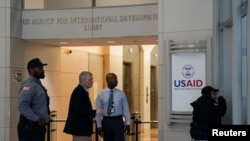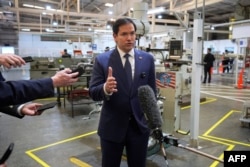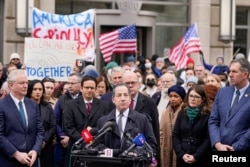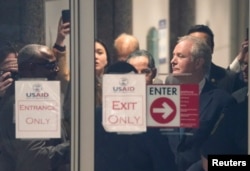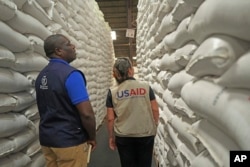The U.S. Agency for International Development (USAID), which manages tens of billions of dollars' worth of U.S. foreign aid programs, was essentially closed down on Monday, with employees locked out of their offices and computer systems. Several senior figures in the agency were placed on leave as the Trump administration took steps to fold its functions into the Department of State.
Speaking to reporters in El Salvador, where he was traveling, Secretary of State Marco Rubio said he is now USAID’s acting director and would be taking steps to bring the agency’s activities in line with the policies of the administration.
Rubio described the agency as historically “unresponsive” to Congress and the White House, even though the agency, he claimed, is supposed to take its direction from the State Department.
“USAID has a history of sort of ignoring that and deciding that there's somehow a global charity separate from the national interest,” Rubio said. “These are taxpayer dollars, and we owe the American people assurances that every dollar we are spending abroad is being spent on something that furthers our national interest.”
Rubio’s comments were less harsh than those of billionaire Elon Musk, who President Donald Trump has given significant power to overhaul the federal government, and whose newly formed Department of Government Efficiency (DOGE) sent representatives into USAID offices over the weekend.
“USAID is a criminal organization,” Musk wrote on the social media platform X on Sunday. “Time for it to die.”
Democrats protest
Democrats in Washington described the effort to dismantle USAID as blatantly illegal and vowed to challenge it.
On Sunday, all 10 Democratic members of the Senate Foreign Relations Committee sent a letter to Rubio outlining their objections.
“Congress established the U.S. Agency for International Development (USAID) as an independent agency, separate from the Department of State, to ensure that we can deploy development expertise and U.S. foreign assistance quickly, particularly in times of crisis, to meet our national security goals,” they wrote.
“For this reason, any effort to merge or fold USAID into the Department of State should be, and by law must be, previewed, discussed, and approved by Congress,” the letter said.
In a news conference in front of USAID headquarters in Washington, Democratic Senator Chris Van Hollen, a member of the Foreign Relations Committee, said that he and his colleagues would prevent Trump from filling vacancies at the State Department in response to the administration’s actions.
“We will do everything we can to block State Department nominees from going forward until this illegal action is reversed,” he said.
USAID history
USAID was created in the early 1960s, at a time when there was a widespread understanding in post-World War II Washington that U.S. aid efforts, administered by a patchwork of agencies, were inefficient, often duplicative, and sometimes contradictory.
In many cases, aid was also explicitly tied to the United States’ political priorities, rather than the objective level of need present in nations receiving assistance.
In 1961, President John F. Kennedy’s administration undertook a broad review of U.S. aid programs, and he subsequently asked Congress for the authority to develop a new agency to coordinate foreign aid efforts.
In a message to Congress, Kennedy proposed an agency that would create country-specific teams that would operate on the ground in recipient nations to develop long-term plans. He described these as “a carefully thought-through program tailored to meet the needs and the resource potential of each individual country, instead of a series of individual, unrelated projects.”
“Frequently, in the past, our development goals and projects have not been undertaken as integral steps in a long-range economic development program,” Kennedy said. “Long-term planning and financing — the only way to make meaningful and economical commitments.”
Created by executive order
Later that year, Congress passed the Foreign Assistance Act of 1961, requiring the abolition of several existing aid programs and directing the president to designate a new entity to take responsibility for their operations. The act also explicitly separated foreign military aid from humanitarian aid programs.
Shortly thereafter, Kennedy signed the bill into law and issued Executive Order 10973, creating the U.S. Agency for International Development.
The agency was structured such that its administrator reported directly to the Secretary of State, rather than up through the chain of command within the State Department. It was an arrangement that allowed USAID some freedom of operation, but one that would be challenged repeatedly over the years, as successive secretaries of state sought to force USAID’s priorities into closer alignment with State Department policies.
Many successes
Over the ensuing 60-plus years, USAID tallied a considerable number of successes, and also weathered numerous controversies and scandals, many of which were catalogued by journalist John Norris in a history of the agency published in 2021, the year of its 60th anniversary.
USAID-provided food aid has saved countless lives around the world, and its early focus on developing competent local governance structures was central to helping countries like South Korea and Taiwan develop flourishing industrial bases.
In the late 1960s, the agency took on a leading role in the global effort to eradicate smallpox, which had killed an estimated 300 million people since the dawn of the 20th century alone. The agency helped spearhead inoculation programs across the developing world that contributed to the first known global eradication of disease in the human population through a public health program.
USAID also helped pioneer the use of oral rehydration therapy (ORT) for children afflicted with diarrhea. By distributing packets of water-soluble salts and sugars, the agency has helped prevent the deaths of millions of children in developing countries.
The agency has also been at the forefront of efforts to reduce the incidence in developing countries of mothers’ deaths during childbirth and reducing the spread of sexually transmitted diseases, in particular HIV.
Controversies
Despite Kennedy’s hope that the distribution of U.S. aid could be disentangled from geopolitics, USAID has, many times in its history, found itself supporting abusive or autocratic governments, frequently in Latin America, because the federal government believed doing so was in the national interest.
Public discontent with USAID grew in tandem with frustration at the war in Vietnam, where the agency had played a major role in unsuccessful “pacification” programs meant to win the “hearts and minds” of the Vietnamese people. President Richard Nixon attempted to capitalize on that discontent to abolish the agency and decentralize foreign aid programs.
Instead, Congress took steps to refocus the agency’s efforts, directing it to back away from high-level engagement with foreign governments in favor of work on rural development and aid to the neediest.
In the ensuing years, however, controversies continued to emerge, none more prominent than those arising from the agency’s activities during the wars in Afghanistan and Iraq. Widespread questions were raised, including by members of Congress, about how the agency spent funds earmarked for reconstruction of those two countries.
VOA State Department Bureau Chief Nike Ching contributed to this report.




